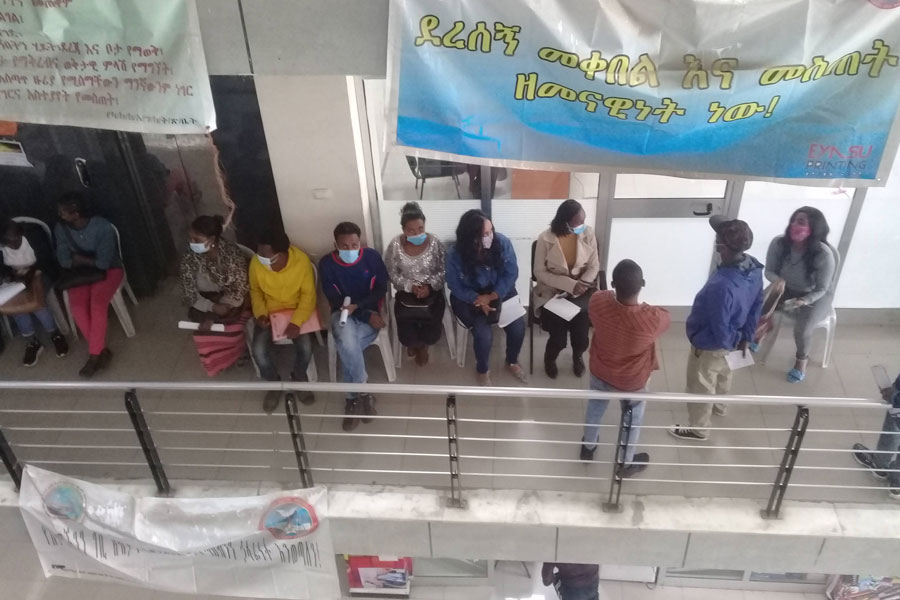
Fortune News | May 26,2021
A severe shortage of feed for chickens, coupled with a lack of forex for vaccines imports, threatens the poultry sector.
The price of feed resources has been on an upward climb for months and shows no signs of stabilising. Though about 70pc of poultry feed is generated from maize and soybean, it can contain up to 10 varieties of grain and legume products. A quintal of maize was sold last month for 1,400 Br, but it has since jumped to over 2,000 Br. A quintal of soybean, which was sold at 3,000 Br just three months ago, is up to 4,000 Br.
Industry insiders fear this could potentially drive the already high costs of poultry products up and impacts farms struggling to obtain inputs, including supplementary nutrition necessary to keep their animals healthy.
"Raw materials suppliers might be hoarding to make more profit, thinking that NGOs will buy their products," said Demeke Wondimagegn (DVM), an industry insider with over 12 years of experience.
Ethiopia exports poultry feed, mainly to the Middle East – a significant influence on the business of farms. With shortages due partly to the diverted supplies, it threatens to bankrupt some of the 14 large poultry farms. The bigger farms distribute their products to small-scale poultry farmers, who are unable to keep up with the continually rising costs of feed.
Hope Poultry Farm is a case in point.
Last month, the farm bought 5,000 heads of chicken from EthioChicken, a large-scale enterprise, for 52 Br each. Though the company hoped to sell the chickens raised on its farm at 160 Br, it could only find buyers for 3,000 for 110 Br apiece. Inability to cope with rising feed costs, which have gone up by 500 Br to 2,950 Br a quintal in recent weeks, compelled the managers to sell for a price much lower than what they had hoped to get, according to Eskindir Denberu, the manager of Hope Poultry Farm.
"We use three quintals of poultry feed a day," Eskindir told Fortune. "We can't continue our business with these prices."
Businesses like Eskindir's also have to contend with a lack of supplementary nutrition products to keep the chickens healthy. This combination of vitamins, minerals, and amino acids, dubbed 'premix,' is imported, mainly from the Netherlands. A shortage of foreign currency has curtailed the supply.
A shortfall in parent stock needed to lay eggs is also a challenge facing the farms. These take up to five months to begin laying eggs and remain producing eggs for about a year before they are replaced. The dearth of foreign currency is an issue here, with businesses like Alema Poultry Farm, located in Bishoftu, taking a hit.
"We have no parent stock on our farm," said Ermias Alemayehu, production and marketing manager of Alema Poultry Farm.
The farm supplied the market with a chicken at 115 Br last year but this has increased to 190 Br over the last 10 months. An egg was at four Birr but has gone up by 1.5 Br, while the price of a single chick has almost doubled to 50 Br. The farm also runs into problems in getting vaccines for chickens.
"If the chickens don't get the vaccination, all of them may die," said Ermias. "The potential diseases can destroy the mass of poultry."
If left unattended, this pile of problems may force Alema and others to close business soon, their managers warn.
The decline in the number of small poultry farms has an impact on the business of large farms and the total production of chicken, according to Berhanu Million, manager of the Ethiopian Poultry Farms Association.
The prospect of small poultry farms going out of business may have far-reaching consequences that go even beyond the increase in the prices of poultry products. They are the most important in producing meat products in a short period of time, and the decrease in poultry feed has a direct impact on the overall demand for meat products, according to Demeke.
"Poultry farms play a crucial role in availing a balanced diet, and the government should focus on their development," said Demeke.
Industry operators such as Lema Asfaw, founder of Alema Poultry Farm, believe the government has not given the attention the industry deserves to get.
Officials at the Ministry of Trade & Industry have commissioned a study, through the Ethiopian Meat & Dairy Industry Development Institute, to identify the challenges faced by the farms.
According to Tadesse Teshome, director of poultry research at the Institute, the farms' managers have raised legitimate issues.
"They're indeed facing numerous challenges, from a shortage of feed to the lack of foreign currency," Tadesse admits. "We had already presented an earlier assessment last week. We are to conduct a large-scale study to identify root causes to recommend a solution to policymakers."
PUBLISHED ON
Jun 12,2021 [ VOL
22 , NO
1102]

Fortune News | May 26,2021

Agenda | Jul 03,2021

Agenda | Jul 29,2023

Fortune News | Jul 11,2021

Fortune News | Sep 29,2024

Dec 22 , 2024 . By TIZITA SHEWAFERAW
Charged with transforming colossal state-owned enterprises into modern and competitiv...

Aug 18 , 2024 . By AKSAH ITALO
Although predictable Yonas Zerihun's job in the ride-hailing service is not immune to...

Jul 28 , 2024 . By TIZITA SHEWAFERAW
Unhabitual, perhaps too many, Samuel Gebreyohannes, 38, used to occasionally enjoy a couple of beers at breakfast. However, he recently swit...

Jul 13 , 2024 . By AKSAH ITALO
Investors who rely on tractors, trucks, and field vehicles for commuting, transporting commodities, and f...

Jul 5 , 2025
Six years ago, Ethiopia was the darling of international liberal commentators. A year...

Jun 28 , 2025
Meseret Damtie, the assertive auditor general, has never been shy about naming names...

Jun 21 , 2025
A well-worn adage says, “Budget is not destiny, but it is direction.” Examining t...

Jun 14 , 2025
Yet again, the Horn of Africa is bracing for trouble. A region already frayed by wars...